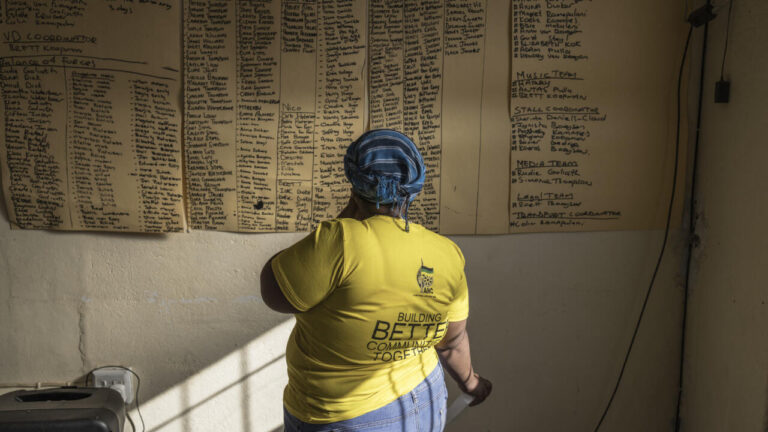Early voting began in South Africa’s general election Monday, as those who must work on polling day or who have special needs were given a chance to cast their ballots in a poll that could see the end of the political dominance of the African National Congress (ANC), 30 years after Nelson Mandela led it into power.
Around 1.6 million out of the 27.6 million-strong electorate were allowed to cast their ballots early, according to South Africa’s Independent Electoral Commission (IEC).
Election agents will visit 624,000 people with mobility issues at home, while essential workers will attend polling stations two days earlier than the general populace.
On Wednesday, the rest of the country will be called to vote in South Africa’s sixth general election, three decades after the advent of democracy in 1994.
The vote could prove a historic turning point if, as opinion polls predict, the ruling African National Congress (ANC) loses its absolute parliamentary majority for the first time.
At no point since world media beamed iconic images of Black South African voters queueing to cast ballots 30 years ago for the first time following the end of white-minority rule has the ANC looked so likely to lose its parliamentary majority.
Polls suggest the ANC’s share of the vote could fall as low as 40%, compared with 57.5% in 2019, which would force the party into a wobbly coalition with rivals – and potentially expose President Cyril Ramaphosa to a leadership challenge.
Monday’s early voting followed a weekend of final campaigning by South Africa’s four main political parties.
‘We will do more and we will do better’
ANC supporters gathered at a football stadium in Johannesburg on Saturday to hear a speech by Ramaphosa and senior party leaders.
As thousands of supporters in the ANC’s black, green and gold colours attended its last major rally before the election, Ramaphosa recognised some of the grievances of South Africans, which include high levels of poverty and unemployment that mainly affect the country’s Black majority.
“We have a plan to get more South Africans to work,” Ramaphosa said. “Throughout this campaign, in the homes of our people, in the workplaces, in the streets of our townships and villages, so many of our people told us of their struggles to find work and provide for their families.”
The president won cheers as he pledged not to scrap black economic empowerment programmes and suggested a possible raise in grant money for the poor.
“We will do more and we will do better,” the 71-year-old millionaire former businessman told the crowd, branding the ANC “the only political party in the whole of South Africa that can bring so many people together in one place”.
“We gather here carrying together the hopes and aspirations of millions,” he said. “Our people will decide whether our country continues to move forward with the ANC to a brighter future or turns back to a terrible past.”
Opposition campaigns for change
The main opposition Democratic Alliance party had a rally in Cape Town, South Africa’s second-biggest city and its stronghold, on Sunday.
Party leader John Steenhuisen made a speech while supporters in the DA’s blue colours held up blue umbrellas.
“Democrats, friends, are you ready for change?” Steenhuisen said. The crowd shouted back “Yes!”
Sunday’s rally coincided with that of the smaller opposition Inkatha Freedom Party, which has the populous KwaZulu-Natal province as its stronghold and has committed to work with the main opposition.
A coalition between the DA and other parties including the Patriotic Alliance in the Johannesburg council after the 2021 local government elections collapsed, handing power back to an ANC-led coalition and resulting in political animosity between the two parties.
Speaking ahead of its final rally in the city of Richards Bay in KwaZulu-Natal on Sunday, Inkatha Freedom Party leader Velenkosini Hlabisa said their main objective was to see the current government removed.
“The IFP is campaigning to remove the ANC from power and become part of the government at a policy making level and also cut the ANC to below 50% at national level.”
“We are calling on people to take action and vote IFP to remove the government that has failed them,” said Hlabisa.
He said most negotiations would take place after the results were in. Hlabisa highlighted unemployment, poverty, crime and the country’s electricity crisis as some of the major problems South Africans are facing.
“We all know the crisis we are facing, we all know the depth of the struggle in South Africa and the daily trauma so many people endure. What the country needs to hear is that there is a way out,” he said.
The far-left Economic Freedom Fighters had their last big pre-election gathering in the northern city of Polokwane, the hometown of fiery leader Julius Malema. “The people of South Africa must decide if they want unemployment,” Malema said.
The new MK Party of former South African president and former ANC leader Jacob Zuma was also campaigning in a township just outside the east coast city of Durban, although Zuma didn’t attend the event. The 82-year-old Zuma rocked South African politics when he announced late last year he was turning his back on the ANC and joining MK, while fiercely criticising the ANC under Ramaphosa.
Zuma has been disqualified from standing as a candidate for Parliament in the election because of a previous criminal conviction, but MK is still allowed to use his image as its leader and he continues to campaign. His daughter, Duduzile Zuma-Sambudla, attended the rally, where MK followers chanted: “Run, Ramaphosa, run.”
(FRANCE 24 with AFP, AP and Reuters)



